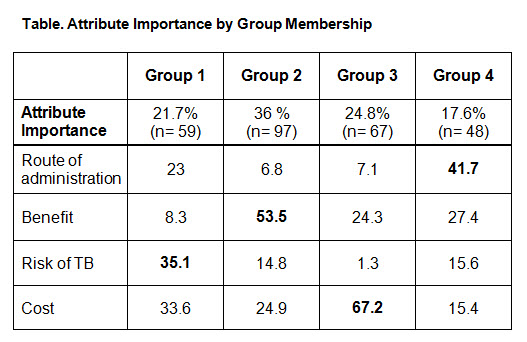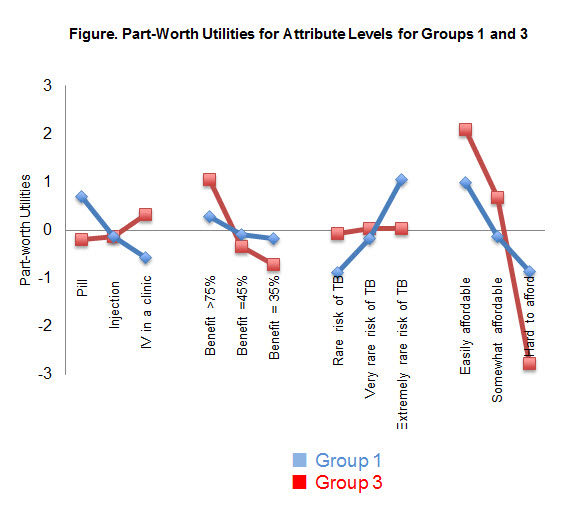Session Information
Session Type: ACR Poster Session C
Session Time: 9:00AM-11:00AM
Background/Purpose: Data describing patients’ priorities,
concerns, and preferences are essential to inform important decisions in health
care, including treatment planning and the development of programs to improve
access and delivery of care. Traditional statistical approaches which measure
the association between patient characteristics and aggregate preferences have
failed to explain preference heterogeneity. In this study, we sought to examine
the value of latent class analysis (LCA) as a means to describe variability in
patients’ preferences.
Methods: We administered a discrete choice
experiment to examine preferences for a hypothetical medication varying across 4
attributes (each having 3 levels): route of administration, benefit, risk of a
rare adverse events and cost for a standardized patient with joint pain,
migraines and fatigue. Subjects were women, between the ages of 20 and 49 years,
admitted to the hospital or infusion center. Gender and age were restricted to decrease
the known influence of these factors on treatment preferences. We used LCA to
calculate part-worth utilities (value computed
for each level of each attribute on an interval scale), and to determine
whether the importances of each attribute clustered into distinct groups.
Results: Subjects’ (N=271) mean age was 34 (SD=8)
years; 94 were non-Hispanic White, 95 non-Hispanic Black, and 82 Hispanic, 27%
of all subjects had a college degree, 41% had an annual income of at least
$40,000 and 45% rated their health as being fair or poor. LCA revealed that preferences
could be clustered into 4 distinct groups. Importance scores for each attribute
by group membership are summarized in the Table. Subjects in Group 1 were
influenced primarily by the risk of TB and cost, those in Group 2 focused
mostly on benefit, while subjects in Group 3 were most concerned with cost. A
distinct group of subjects (Group 4) were strongly influenced by route of
administration. An illustrated example of the difference in incremental value
assigned to varying levels of each attribute is provided in the Figure below.
For instance, subjects in Group 1 gained utility (or value) as the risk of TB
was progressively lowered, whereas subjects in Group 3 were not sensitive to
changes in the risk of TB.
Conclusion: LCA is able to generate unique sets
of preferences that can then be used to inform decisions. It can identify which
sets of attributes are preferred by unique groups of patients and which
priorities are shared across groups, thus enabling end users to allocate
resources that are most likely to benefit the greatest number of patients and/
or tailor programming to focus on patients with specific needs.
To cite this abstract in AMA style:
Cozmuta R, Bhalla S, Fraenkel L. Representing the Variability in Patients’ Preferences [abstract]. Arthritis Rheumatol. 2015; 67 (suppl 10). https://acrabstracts.org/abstract/representing-the-variability-in-patients-preferences/. Accessed .« Back to 2015 ACR/ARHP Annual Meeting
ACR Meeting Abstracts - https://acrabstracts.org/abstract/representing-the-variability-in-patients-preferences/


